Don’t get me wrong, I like advertising. And if you think that this is an obvious remark (since, you know, I work in advertising) what I’m about to say could make you think otherwise.
In fact, if I ended up working in advertising it is because I like it, not the other way around. It gives you a fair opportunity* to promote your ideas/products/services. So I think that advertising is, as a 4-year-old kid would say, “a good thing.” Then what’s the problem?


The problem with advertising, as with everything else, is when there is “too much.” And I don’t think anybody would be surprised if I say that there’s too much advertising on the WWW (World Wide Web).
Eating is good, eating too much is not. Exercising is good, exercising too much is not. Advertising is good, advertising too much is not. “Oh, but you should be interested in more and more advertising since this is how you make money.” Well no, because too much advertising is not good for my clients’ business, therefore is not good for my business. And WWW has reached that point, saturating itself with advertising, disturbing the experience of the users to a level where instead of attracting them it is driving them away.
I know that, for some, disturbing the experience of the user = advertising, in any media or form. Not that I agree, but I understand the point. The question here is the magnitude of annoyance when mixed with technology’s capabilities. Something that only the WWW is able to do today. Allow me to be more specific:
Scenario 1 – This happens with all mass media: When you have been impacted with several commercial messages even before being able to start reading or watching its content. That happens everywhere: TV, magazines, Internet, even with Apps. So that sucks, but it’s not only happening on the WWW.
Scenario 2 – This only happens on the WWW: a) When you’re trying to open a website that takes too long to be loaded because there are multiple processes working at the same time (processes that will decide which one of the multiple commercials must be put in front of your screen), and b) then you discover that this is not the article that you wanted to read but another commercial hiding as an article (because it’s impossible to distinguish between what’s an actual article and what’s crap “posing” as an article, aka clickbait). So c) the experience becomes so disturbing that you end up not even accessing the content that you where trying to reach. And you probably wouldn’t even have had a chance to be interested in any commercial message because there were so many of them.
This is happening more and more. No matter how fast your Internet connection is, sometimes you are watching online videos with the same quality that you were watching VHS in the 80s.
In my personal experience, I’ve banned some websites on my browsers because they are a waste of time. It doesn’t matter what their content is, you may never reach it.
Does this mean that those websites have a problem? Not from their point of view. What it means is that those websites believe that they are creating a business opportunity by saturating themselves with commercials so they can offer you, the user, a premium/paid access to their content “Ad-Free.” Like, for example: YouTube planning subscription service for ad-free videos (Source: arstechnica.com | April 8, 2015). And we, the advertising industry and our clients, are paying for it. Or that’s what they want us to do.
So should we just stop using the WWW?
Even though this subject has already been in the air for a while (back in 2010 Wired already said that “The Web Is Dead”), it is pretty complicated to believe that the World Wide Web will disappear soon. What, in my opinion, it’s going to happen is that the WWW will transform into something different from what we know today. The same way magazines and newspapers had to transform. The same way TV is transforming. How will the WWW transform? That I don’t know. Some would say that the Apps are actually that transformation (if you need to access your bank account online don’t go to the WWW, just open the App).
What I know for sure is that we shouldn’t keep advertising on the WWW as it’s currently being done. It’s just not helping us. It’s not helping our clients. It’s not helping the users.
Like in any other mass media available out there, we should keep using the WWW in an engaging, smart and responsible way. Simply put: if it’s oversaturated, don’t be part of it. Nobody is going to feel positively motivated when your idea, product or service not just interrupts them but prevents them from accessing the content.
Note: Do not confuse the WWW (World Wide Web) with the Internet.
*About that fair opportunity:
Someone could say: “Well, advertising is not that fair when there is a big difference between budgets.” And I would reply: “The opportunity to promote is fair because it’s available to everybody; but the extension, size and range of that promotion is limited by a budget and the market.” And we should remember that the efficiency in advertising is not related to the size of a budget but the quality and precision of the message. It doesn’t matter if your message is all over the place (TV, billboards, print, Internet…), if it’s the “wrong message.” But with the “right message” all doors will open.

